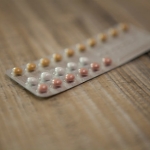Preliminary reports have suggested that menstrual irregularity may occur more commonly in women with mood disorders than in the general population. What has been unclear, however, is whether these menstrual cycle irregularities reflect an underlying disruption of the hypothalamic-pituitary-gonadal (HPG) axis in women with mood disorders or are caused by the psychotropic medications used to treat these psychiatric disorders.In a recent study, Dr. Hadine Joffe of the Center for Women’s Mental Health and her colleagues assessed the prevalence of menstrual cycle dysfunction in 3 groups of women: (1) with bipolar disorder, (2) with unipolar depression, or (3) with no psychiatric illness (Joffe 2006).
Subjects were drawn from two large studies which used the same questionnaires to collect data regarding a wide range of demographic and clinical variables, including menstrual history and age at onset of illness. Subjects with DSM-IV bipolar disorder (n=295) were derived from the Systematic Treatment Enhancement Program for Bipolar Disorder (STEP-BD). Subjects with DSM-IV unipolar depression (n=245) or no psychiatric illness (n=619) were selected from the Harvard Study of Moods and Cycles. In this study, early-onset menstrual dysfunction was defined as menstrual cycle irregularity occurring within 5 years of the onset of menses and before the onset of psychiatric illness, either menstrual cycle length unpredictable within 10 days or menstrual cycle length < 25 days or > 35 days.
Early-onset menstrual cycle dysfunction was retrospectively reported to have occurred in 101/295 women with bipolar disorder (34.2%), 60/245 women with depression (24.5%), and 134/619 healthy controls (21.7%). After adjusting for age, body mass index, ethnicity, age at menarche, and marital, educational, and employment status, women with bipolar disorder were 1.7 times more likely to report early-onset menstrual cycle dysfunction than healthy controls (p=.01). Menstrual dysfunction was more common among women with type I bipolar disorder than in women with type II bipolar disorder.
Consistent with prior reports, this study indicates that women with bipolar disorder are more likely to report menstrual irregularities that women in the general population. In contrast, women with unipolar depression did not appear to be at greater risk for early-onset menstrual dysfunction. Because menstrual dysfunction occurred before the onset of illness in the women included in this study, it is possible to exclude medications as a possible cause of menstrual irregularities. These findings raise the possibility that the changes in neurotransmitter systems associated with bipolar disorder may also affect the functioning of the HPG axis.
Ruta Nonacs, MD PhD
*This post was originally published as an article in our Spring 2006 Newsletter.








Leave A Comment